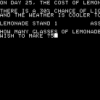Hey game devs, I wanted to ask advice for getting started with game development for a 2d rpg. Some background info
- Yes I've heard that an rpg shouldn't be your first due to complexity (I'm fine with that. Still something I want to make)
- I'm a software developer by trade so I have plenty of experience with various languages like C/C++. python, java, javascript, etc
Me and my friend have currently hit the point where we have all the things such as most of the mechanics bar damage calculations(which I'll get to later) done. We just need to start developing prototypes to test things out such as overworld/local map gen and walking a character through that map. I'm leaning more towards coding the game myself but there could be the option of using a kit like game maker etc. My questions are
- If we use a kit, what's a good one for beginners with 2d rpgs where once we start developing the game it's ours completely? Meaning we don't have to worry about someone saying "You developed it in our kit so we own a fraction of it" or for when we go commercial "We get a portion of the cut for using our kit"
- If we decide to code it ourselves, what's a good language to use? I'm leaning somewhat towards python due to finding a REALLY good engine called fabula that seemed like a dream come true for our needs as far as the look of the game goes(picture Zelda Oracle games on the GBA with pokemon movement style) but quickly found out it be more of a headache then need be due to no documentation of at least any I could find. If we go this route how necessary would a game engine be? I've read that a game engine encompasses things like graphics rendering and handling sound so I'm assuming pretty important. Are there any good freeware ones that you guys would recommend? If I'd have to pay for one the question there would be the ones from above about licensing.
Thanks in advanced for any help you guys can give on this.




